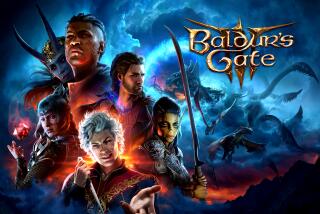‘Tribes 2’ Is Only for Team Players
- Share via
Why play by yourself? It’s a question computer gamers ponder periodically now that massively multi-player online gaming has become so prevalent. Dave Georgeson, senior producer and director of the Internet-based action-strategy title “Tribes 2,” offers a compelling answer.
Q: Why is establishing a sense of community so vital to multi-player games?
I’m not absolutely certain that it is vital to all multi-player games. It’s critical to “Tribes 2” because we base our game on a team-play conceit. Whether you’re talking about real-life football or baseball or whether you’re talking about simulated warfare on a computer, overcoming obstacles alongside your friends and achieving victory as a team are a lot more visceral than most solo experiences.
Q: What makes team-based gaming attractive?
Games that rely on individual effort are great, but you have to be good at everything in order to excel. Team-based games allow people to specialize more and find a niche that they’re great at, which helps the team. Instead of being one man against the universe, you can be the best fighter pilot, the best base defender, the best escort, the best team commander, etc. Then you can assemble a team of bests and compete against other teams. It creates great bonds of friendship, makes shared memories that folks talk about for years afterward and is, in general, a much more social kind of gaming than solo efforts.
Q: Hardest part of supporting more than 50 players at one time?
There are a couple of formidable challenges here. One is making gaming maps and missions that work with anywhere from 10 to 60-plus players. Maps have to allow players to not turn into huge bottlenecks when there are a lot of participants.
The other challenge is network coding. Every object, player and projectile in the world has to be kept track of by the server in a game. In every frame--about 1/32 of a second--that position gets updated and sent to every player that needs to have that information on his system. In other words, if you can see a player, then the server has to update you about his position, his health and more. As you can imagine, that’s a lot of information we have to send.
Q: Play must get pretty wild. Who manages it and how?
Players run their teams in their own fashion and with their own rules. Personally, I like to have a team commander that watches the Command Overview and calls the shots. A lot of teams sidestep the commander decision and instead assign roles to players on a team so that those individuals are responsible for specific duties--a sort of zone defense for the team.
Q: Do you use a system of in-game rewards and punishments?
Although we’re focused mostly on team performance, we also allow players to accumulate individual scores so they can see how much they are contributing to the team’s effort.
As far as punishments go, we pass the punishments off to the players themselves. We have a system of voting in the game that allows players to kick other players out of the game or ban them from the server completely. This allows the gamers running the servers to police their own games effectively and prevent yahoos from disrupting their fun.
Q: Is much strategy really involved in an action game of this ilk?
Tactics can be a big part of a team experience here. Besides being a core action shooter, “T2” also requires a lot of decision making. How much defense do you leave at home? How many folks go on offense? Do you send out feints? Harrying attacks to draw defenders out of position? Yes, this is an action game. But it’s also very much a thinking person’s game if you want it to be.
Q: What role does interpersonal communication play?
Good teams are typically a) talented and b) friends--not necessarily in that order. We’re trying to facilitate folks finding those good teams to play on. We do this by offering in-game e-mail, forums, chat rooms, community browsers and by publishing a centralized news page within the game for tournament announcements, game upgrades, etc. We’re working hard to make it as easy as possible for like-minded folks to find each other.
Q: The most common mistake people make about this type of game?
That it’s just a first-person shooter with more people online. It can be played that way, but it’s an experience far, far beyond what you play when you play something tried and true like “Quake.” Team gaming rocks. And team gaming with jump jets, ground and air vehicles, tactical situations, underwater battles, floating sky bases and more is just way beyond what other games offer.
*
Scott Steinberg is a freelance writer specializing in video games.
More to Read
The biggest entertainment stories
Get our big stories about Hollywood, film, television, music, arts, culture and more right in your inbox as soon as they publish.
You may occasionally receive promotional content from the Los Angeles Times.









